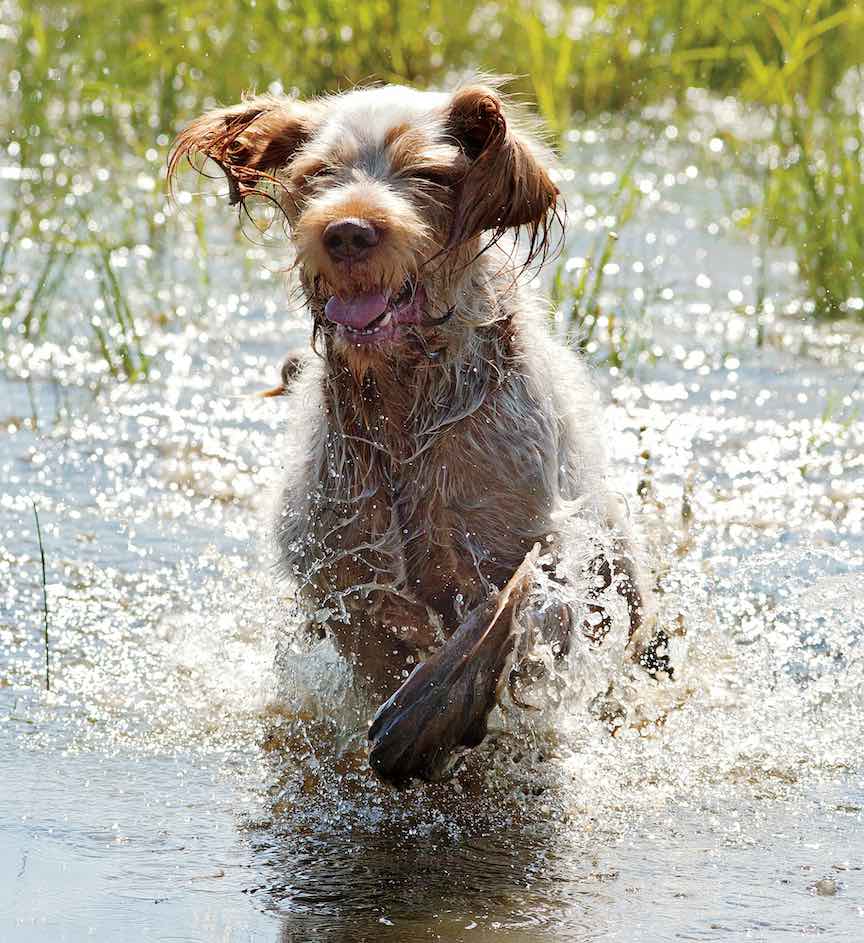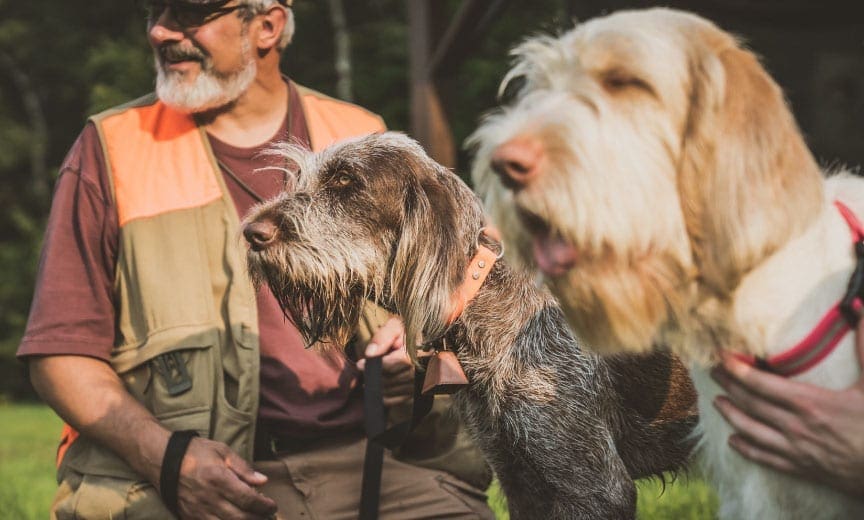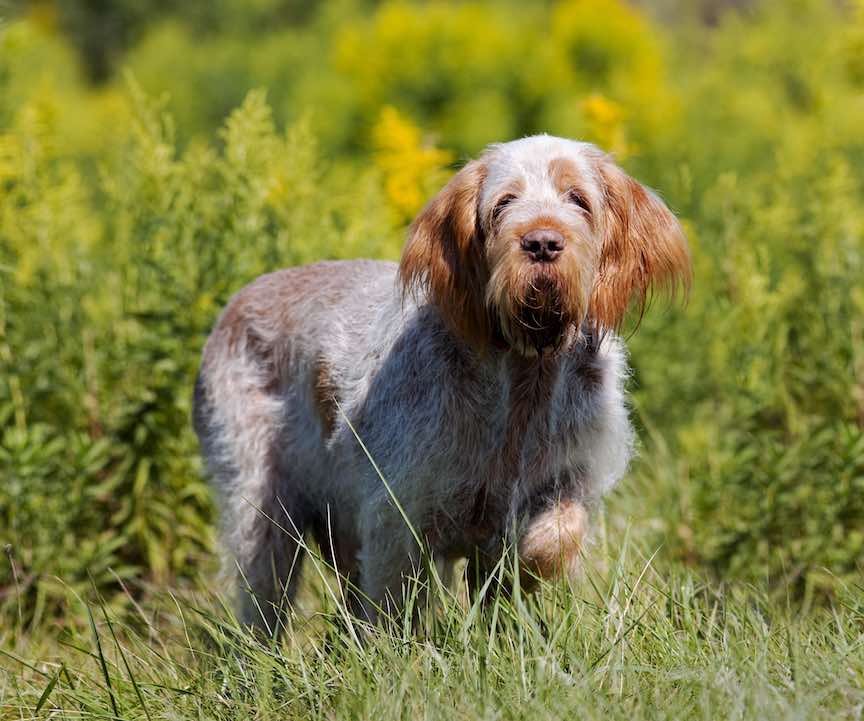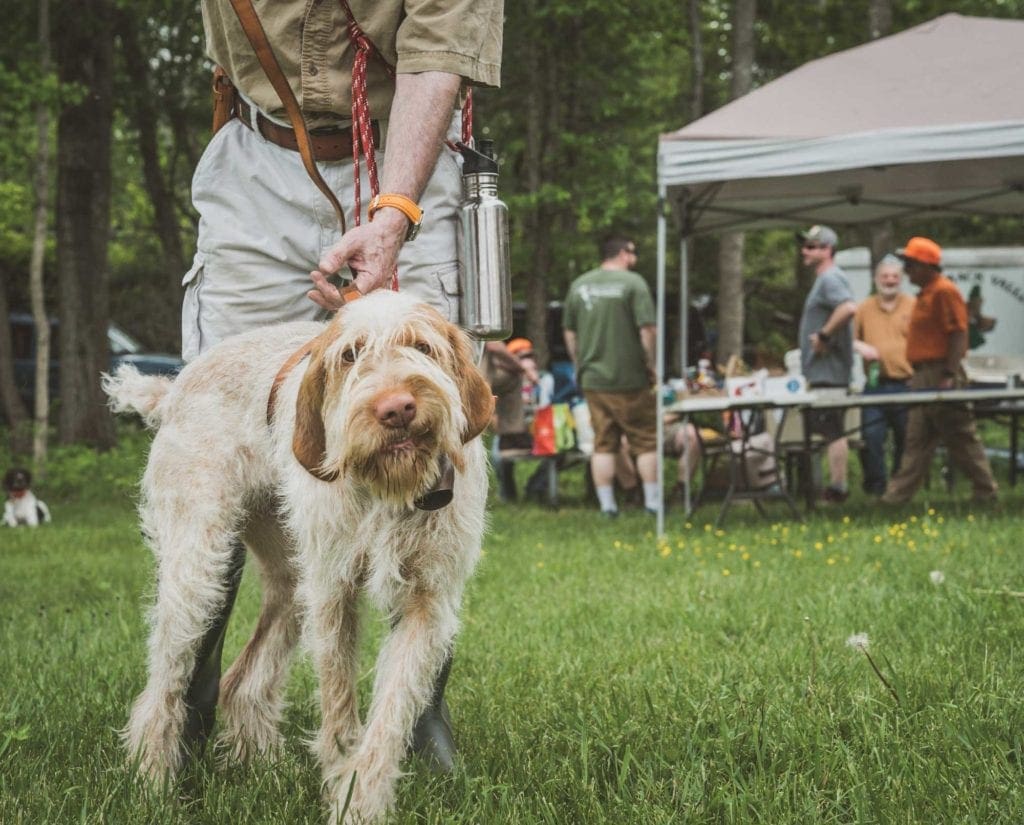The standard, rough-haired Italian pointing canine overcame troublesome odds to develop into a contemporary, versatile searching canine
The primary time I ever noticed a Spinone Italiano, Lisa and I have been having fun with a beer in a small Italian city. I noticed a curious-looking canine and his proprietor strolling throughout the central sq.. The white and orange canine was pretty massive, and because it neared, I observed it had a giant, bushy mustache.
When the pair walked by our desk, I mentioned, “Excuse me, sir, however what sort of canine is that?”
“È uno Spinone,” he replied. “It’s a Spinone.”
Spinone Italiano Bodily Traits
Spinoni are pretty massive, well-built canine with a harsh, rough-haired coat and thick beard and mustache. At first sight, they appear to be a Bracco Italiano with a tough coat, however there are some essential variations below the wiry hair. The Spinone will be bigger than the Bracco, it has a special head form, and the ears are considerably smaller. Just like the Bracco, dewclaws on the hind legs are frequent. The Spinone Italiano is exclusive among the many wire-haired Continental breeds in that it shouldn’t have an undercoat.
The coat shade will be pure white, white with orange markings, white speckled with orange, white with brown (chestnut) markings, roan or brown roan (chestnut). The popular shade of brown is known as tonaca di frate (Friar’s frock), a barely lighter and extra reddish shade of brown than the liver shade of the German Wirehaired Pointer. Tricolor, tan, or black markings are usually not allowed.
Spinone Italiano Searching Model
Of the 2 Italian pointing breeds, the Spinone is taken into account the higher alternative for searching in robust situations. It’s famend for its potential to work all day, in all kinds of terrains, particularly in tough, dense cowl or deep water.
Up to now, Spinoni have been regarded as close-working, gradual, virtually torpid hunters. Nonetheless, as Italian breeder Daniele Serafino explains, the previous stereotype now not applies:
We’re witnessing an actual evolution of the breed these days. The conformation normal has remained roughly the identical and the candy character that has been handed down over the centuries remains to be there. However the working skills have improved enormously. There at the moment are sure extremely developed bloodlines that, along with the everyday character of the breed, show a outstanding confidence that interprets into an even bigger vary, quicker trot, and really strong and infrequently very sudden factors.
Subject Search
The standard subject search of the Spinone Italiano is much like that of its cousin, the Bracco Italiano. In truth, a lot of their working requirements is similar. Within the subject, nevertheless, there are variations. The trot of a Spinone just isn’t fairly as quick as that of the Bracco. The top is held excessive, however not as excessive as a Bracco’s. The rhythm of the trot is extra staccato and the rear legs don’t prolong as far backward with every stride. This kind of trot might require much less power and is a elementary characteristic of the breed. It’s mentioned to allow the breed to hunt all day, day-after-day, with out tiring. When it comes to vary, the Spinone ought to cowl a great quantity of floor out to about 100 meters.
Spinoni additionally have a tendency to point out extra of a mixture of trotting and galloping than the Bracco. Italian subject trialers and hunters say that the Bracco is extra of a stylist, whereas the Spinone is extra of a flexible “meat canine,” in one of the best sense of the phrase.

Retrieving And Water Work
Spinoni will be wonderful water staff. Most are robust swimmers that develop a love for water work early on. The dense and harsh wire-haired coat presents good safety from the chilly and from the tough cowl of wetland areas. A Spinone could also be a good selection for devoted waterfowlers, however they are often pretty massive canine so is probably not your best option for understanding of a tippy canoe.


Character and Coaching Concerns
The phrases most frequently used when describing a typical Spinone are lovable, candy, mellow, easygoing, and affectionate. Spinone are huge, rough-and-tumble canine which will give the impression of being robust as nails. However by way of temperament many are huge softies. Anybody coaching a Spinone must preserve this in thoughts. Ottavio Mencio, a breeder of Spinoni in Italy, informed me:
One of the best ways to coach a Spinone is to make it enjoyable and fascinating for them. There isn’t any want to make use of pressure, so go simple on them; they’re cooperative college students and need to please you. They’re clever, affordable canine, however a few of them can have a jealous streak. Females are normally extra delicate than the males and will be trickier to coach.
The Story Behind the Identify of the Spinone
“Spinone” is derived from the Italian phrase for thorn: spina. It could confer with the breed’s harsh coat and/or the thorny terrain through which it excels as a hunter. Not like lots of the different Continental breeds, the title is kind of the identical in nearly any language. The English, French, Dutch, Danish, Spanish, and Germans all name the breed Spinone and use the Italian plural: Spinoni.
Throughout a lot of the 1800s the most typical title for the breed was Bracco Spinoso. Numerous regional dialects used different phrases. In Piedmont, it was the Restone; in Tuscany, the Spinoso; and within the Naples space, Bracco Restoso. In 1887, Ferdinado Delor prompt that the title Spinone be adopted for the breed. The Kennel Membership of Italy agreed, and the title was accepted shortly thereafter.


Some English audio system name the breed Italian Spinone or Spinone Italiano. However the time period is considerably redundant. There is just one “Spinone”, so there’s actually no must qualify it with the phrase “Italian.”
Historical past of the Spinone Italiano
Nearly any historical past you’re prone to discover on the Spinone will declare that the breed was created within the furthest mists of time. However a number of imprecise references to searching canine in obscure Greek poems are usually not sufficient to show an historic origin.
The Spinone In Artwork
Alternatively, photographs present in Renaissance work do present canine resembling the Spinone in Italy at the least way back to the 1400s. Maybe probably the most intriguing picture is one discovered on the west wall of the Ducal Palace in Mantua. Painted by Andrea Mantegna circa 1474, the fresco is split into three panels. The left panel exhibits a horse and 4 males with searching canine that seem like greyhounds and mastiffs. The fitting panel, sometimes called “The Assembly,” is alleged to symbolize Ludovico Gonzaga, his son, Cardinal Francesco, and different members of his household. Within the backside left nook of the scene, behind Ludovico’s legs, is a small, rough-haired canine could also be a Spinone Italiano ancestor.
The Spinone In Literature
Regardless of different historic photographs that includes canine that resemble Spinoni, the primary written reference to the breed was made by Bonaventura Crippa in 1834. He wrote, “We should always not neglect to say the hard-coated Bracco generally referred to as Spinoso.”
Many breed histories level to these sentences as the primary time the Spinone Italiano as talked about within the literature, albeit with a barely totally different title. Nonetheless, all of them skip over the very subsequent line the place Crippa claims that the Spinoso was English! “This species of canine originated in England and is utilized by us extra to hunt within the marshes and the woods,” he wrote.
It’s not clear how Crippa got here to consider that the “hard-coated Bracco generally referred to as Spinoso” got here from England, however he’s absolutely mistaken. Tough-coated canine had existed in Italy and throughout all of Europe for hundreds of years, wherever short-coated canine blended with long- or curly-coated breeds. In any case, no different work on the Spinone mentions an English connection. The entire main authorities agree that the ancestors of the Spinone have been in all probability native to Italy.
In Les Chiens d’Arrêt, writer Jean Castaing gives us with the almost definitely state of affairs for the event of the breed. “I consider that the Spinone developed in roughly the identical approach as different such breeds… Like all different pointing griffons was born from the cohabitation of braques and barbets,” he wrote.


Early Regional Variations in The Spinone Italiano
By the mid-1800s, Spinoni (plural of Spinone) might be discovered all through a lot of Italy. And like their cousin, the Bracco Italiano, differing kinds have been seen within the varied areas. In Piedmont and Lombardy, Spinoni tended to have tough brown and white or orange and white coats. Within the Veneto space, they’d longer, softer brown roan coats.
Not solely have been there totally different coat varieties and colours in varied areas, nevertheless it appears that virtually each noble household was breeding their very own variations as properly. In I Cani Da Ferma Italiani, Giambattista Benasso wrote, “Many aristocratic households or of upper courses had their very own ‘breed’ of Bracchi or Spinoni, merely numerically small households from which they tried to get people with the looks and aptitudes that have been required by the native searching tradition and atmosphere.”
Regardless of their many types, virtually everybody agreed that the Spinone was higher suited to the wetlands than the Bracco. Bonaventura Crippa wrote, “Evidently nature, having granted it a protracted and tough coat, has particularly destined it to take care of reeds and thorns. Its subject search is pretty energetic and protracted, and a hunter who hunts for birds solely within the woods and swamp may gain advantage much more from it than from the one with quick hair that’s utilized in open and arid nation.”
Early Improvement Of The Breed
When tracing the event of the Spinone, keep in mind that all through a lot of the 1800s, the complete Italian peninsula underwent large social, political, and financial modifications. Insurrections, revolts, and two wars of independence lastly led to Italian unification in 1861. By the Eighties, the nation had made nice progress by way of training, well being care, and political stability. And, like elsewhere in Western Europe, searching and canine breeding grew to become more and more common with the rising center class.
Spinone Cross-Breeding With Stichelhaars, Griffons, And Different Wirey Breeds
Enter Ferdinando Delor, author, editor of the influential journal Caccia e Tiro (Searching and Capturing) and founding member of the Italian Kennel Membership. Among the many membership’s first duties was bringing order to the Spinone breed. To take action, they solely accepted solely canine that met the newly established breed normal. The membership additionally determined whether or not or not crossing to different rough-haired breeds was permissible.
Delor prompt that crosses to the Stichelhaar—he referred to as it a “German Spinone”—and the Korthals Griffon might lend the Spinone a serving to hand. He wrote, “Within the, allow us to say, depressing state through which our rough-haired breeds are discovered, these crosses could be advisable…the German Spinone and the Griffon have an important affinity with ours and, if carried out with intelligence, wouldn’t deliver overly radical modifications to the look and aptitudes of our Italian canine…Have to be cautious concerning the introduction of blood from the Griffon a Poil Soyeux; as soon as introduced in, it’s troublesome to eradicate.”
In Germany and France, many breeders of rough-haired canine, together with Eduard Korthals, believed that every one pointing griffons have been of the identical household and needs to be allowed to combine. It’s comprehensible, particularly after the First World Battle, that breeders have been inspired to cross Spinoni with Korthals Griffons, Stichelhaars, and even German Wirehaired Pointers.


A New Breed
In 1922, the French and Belgian stud books have been opened to the Spinone, which was registered alongside the opposite griffons. However the scenario didn’t final lengthy. Breeders quickly realized that the Spinone introduced with it sure traits, equivalent to an orange and white coat and dewclaws on the rear legs, that have been proscribed in different griffon requirements. As well as, many believed that the Spinone had acquired an excessive amount of “overseas” blood—primarily from English Pointers—within the latest previous, and its normal was shifting away from that of the opposite griffons. The Spinone was subsequently faraway from the Wirehaired Pointing Griffon stud guide and declared a separate and unbiased breed.
“Modernization”
It was round this time, when the breed was struggling to type its personal stud guide and normal, that the Spinone started to really feel the total results of the large importations of chicken canine from England, and to a lesser extent from France and Germany. Spinoni numbers declined as Italian hunters turned their consideration to those quicker, wider-ranging breeds. In an effort to reverse the development, breeders tried to “modernize” their traces. It’s mentioned that crosses to Boulet and Korthals Griffons, German Wirehaired and Shorthaired Pointers, and English Pointers have been carried out on the time, with blended outcomes. Velocity and vary elevated in some traces, however the look and character of the breed was adversely affected.
If the results of unregulated crosses harm the Spinone and the growing competitors from different breeds decreased its numbers, then the Second World Battle practically wiped it out. After all, all the opposite Continental breeds confronted troublesome challenges within the post-war years. However for some breeds, restoration was pretty speedy. Not solely have been breeders capable of rebuild the inhabitants bases, however they managed to enhance the general searching potential throughout the breeds in very quick order.
Recovering The Subject Skills Of The Spinone Italiano
Sadly for the Spinone, restoration took significantly longer. In truth, it was not till the Nineteen Eighties that any actual progress was made by way of subject potential. Evidently Spinone breeders have been gradual to adapt to the quickly altering searching scene in Italy. With extreme reductions in wild sport populations and fewer locations to hunt, their breed earned the repute as an outdated sort of canine saved solely by older hunters unwilling to vary their methods.
To make issues even worse, many breeders had been basing their choice virtually utterly on the breed’s conformation normal and never on its pure searching skills. The few breeders who finally tried to show issues round had an uphill battle. In keeping with Marino Panizza, quoted by Giambattista Benasso, in I Cani Da Ferma Italiani, “Use the good-looking to develop the great by way of searching, which in fact is a really troublesome enterprise. It required years and years of labor, however following the trail laid out by the late Emilio Pedrazzini, who will be thought-about the daddy of contemporary Spinone, the breed lastly rose to a excessive degree.”


The Spinone Right this moment
Right this moment, the Spinone Italiano continues to enhance and acquire floor amongst hunters in Italy and past. The variety of subject trial champions has risen dramatically over the past 20 years. Some Spinoni have even gained all-breed trials on the continent. In North America, the Spinone has discovered a house amongst a good variety of devoted NAVHDA breeders who’ve made wonderful progress lately.
First-Hand Experiences With The Spinone Italiano
After seeing my first Spinone in Italy, I didn’t see one other till a few years later once I attended a NAVHDA check. I used to be there as a spectator, however I wished to snap a number of pictures of canine working within the Pure Means check. Simply earlier than the lunch break, I got here throughout an older gentleman strolling a huge orange and white canine. I had simply spent many of the morning watching younger canine, together with a Braque du Bourbonnais, that weighed not more than 15 kilograms. Once I first noticed the orange and white canine, it seemed as huge as a horse.
Perhaps it was my shocked expression or the best way I feasted my eyes on his canine, however the gentleman stopped and mentioned hiya. I launched myself and requested him, “Is {that a} Spinone?”
The person was Guido Malandruccolo, one of the vital revered Spinone breeders in North America. His Di Morghengo kennel has produced plenty of excellent canine, together with a NAVHDA Versatile Champion and a Westminster Better of Breed winner. Guido was very gracious that day. He patiently answered the handfuls of questions I had concerning the breed.
Efficiency
Since then, I’ve seen a number of extra Spinoni within the North America and a couple of dozen in Italy. When it comes to efficiency, they ranged from truthful to completely excellent. I used to be notably impressed by the water work of two Spinoni in southern Ontario. Seeing 40 kilogram canine cost down the financial institution after which leap into the water may be very spectacular.
In Italy, a few of the finest Spinoni I’ve seen have been in a subject trial Lisa and I attended close to the tiny hamlet of Pian di Spino. There we noticed some very hard-hunting, well-trained canine pitting their abilities in opposition to wild pheasants in a phenomenal setting. All of the canine alternated between a gallop and a trot. Some searched pretty broad and disappeared from view for some time, however would at all times come again. Factors have been strong and the canine have been (largely) regular. All in all, Spinoni breeders in Italy are producing wonderful canine. I perceive why the breed is rising in recognition in North America.
Breed Golf equipment
Spinone Membership of America
Membership Italiano Spinoni
Learn Extra
Six Well-known Searching Canines in Historical past
West of the Rhine – Pointing Canine Breed Origins: HDC Episode #3
How one can Select a Pointing Canine – Breaking Down 38 Hen Canine Breeds
Dad is a Breeder – An Italian Journey of Canines and Eurasian Woodcock














